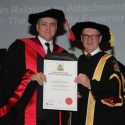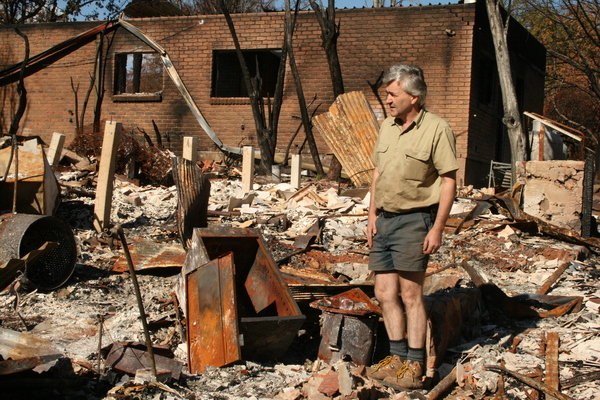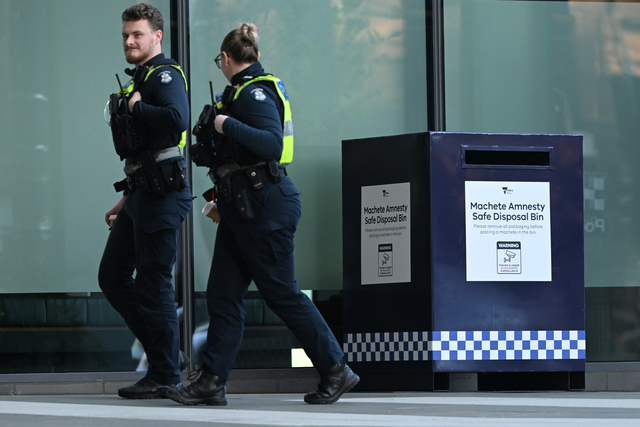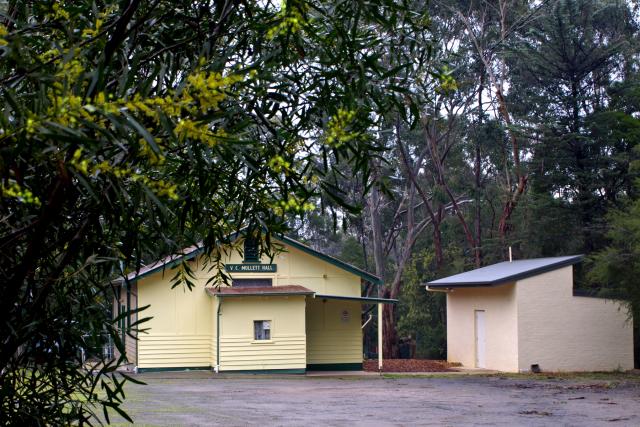By Kath Gannaway
A seven-year research project focused on the recovery of Marysville after the 2009 Black Saturday bushfires has seen Marysville resident David Barton conferred as a Doctor of Philosophy.
Dr Barton, who survived the fires but lost his home, business and more in the fires which devastated the town and resulted in the loss of so many lives, was conferred at RMIT University on 18 May, 2018.
Completed in September 2017, his thesis explored “Disaster in Relation to Attachment, Loss, Grief and Recovery: The Marysville Experience” and Dr Barton said it had been an enormously challenging task.
“I can’t believe it’s nearly 10 years; it feels more like a couple of years ago,” he said of the event that has become a time-marker in the lives of so many Victorians.
Dr Barton noted that his research revealed two key findings about the recovery.
“The first is in relation to people’s reaction to the sudden disruption and loss of their attachment figures, and in particular to people, pets, possessions, place and participation in their community he said.
As a result, Dr Barton has recognised a new phenomenon he has labelled Post Disaster Attachment Trauma (PDAT), explaining that “people may suffer serious short and long-term grief reactions to such sudden loss which may be exacerbated if vital post-disaster attachment-related searching and appraisal behaviour is blocked.”
The second conclusion Dr Barton noted was the level of personal and collective disempowerment experienced by individuals and the community during the recovery process.
Dr Barton said that while the community was consulted about many things, they were often not actually listened to or heard.
As a result, he maintains that much of the Marysville’s recovery occurred in ways that the community did not necessarily support, something he said was especially true in relation to many of the rebuilt public buildings.
“Clearly I was amazed about all the stuff being done to us, particularly the six-week lock out which I saw as being very detrimental, and the whole process around that and the so-called consultation that was happening but not being taken notice of,” he said.
He is critical of the lock out and says the first thing people lost was their property rights.
“This was our place, our property and we were told we could not go home,” he said.
In his thesis he says that in talking with others over time, which commenced immediately after the fires, he found that many had experienced what he had and that many were feeling the same things he was feeling.
“Whilst my negative experiences and those of some others were not universally shared, all of our experiences contributed in varying degrees to personal, emotional and psychological pain and trauma during what was supposed to be the recovery process. It is against this backdrop that I decided to embark upon this project,” he says.
The approach of authorities which he says was based on risk aversion, he says didn’t serve the needs of the Marysville community.
“What they didn’t take into account was the incredible amount of emotional and psychological damage caused by what they did,” he said.
He cites the building of infrastructure such as the police station, visitor information centre and the community centre as examples of where a minority of people were consulted and says most of the people in the community were unhappy at the time and remain so.
“I think the observations I’ve made are reflective of the views (of most people) who were around at that time,” he said.
Dr Barton said he hopes that his findings will contribute towards improved disaster management responses benefitting post-disaster recovery.
He also hopes to turn his thesis into a book so that the findings can become more widely acknowledged and understood.
In terms of plans for the future, Dr Barton said that, for now, he will continue working with the Marysville Bushfire Education Foundation, talking to many school and community groups about bushfire safety and prevention.
“The Foundation is now also working with the local community and government towards the establishment of a National Bushfire Museum, Education and Research Centre to be based in Marysville.”
“Even though many people have had a very difficult time during their individual and collective recovery, we are now starting to see some very positive outcomes develop, and this speaks well for a bright future for both Marysville and the district as a whole,” he said.
Dr Barton’s thesis can be found on-line at: https://researchbank.rmit.edu.au/eserv/rmit:162288/Barton.pdf .









